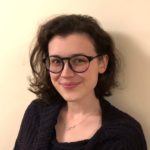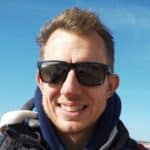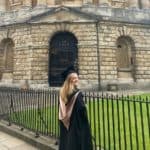-
Asked by kyak1fed on 14 Mar 2024. This question was also asked by deed1sap, anon-391199, anon-391193, drew1raw, fact1peps, desk1tee, sofia xpx, gate1sewn, lottie, anon-406002.0
Question: What brought you to the branch of science that you do?
- Keywords:
-
Kirsty Ross answered on 14 Mar 2024:
It was a long and winding road from an undergraduate and postgraduate degree in microbiology, via jobs in immunology and public engagement with chemistry research, to a role supporting computer scientists to share their research with the world. I now get to investigate how we can make Wikipedia and her sister projects more inclusive, diverse, equitable and accessible.
-
Hayley Pincott answered on 22 Mar 2024:
I had a look around a lab at my local hospital and I absolutely loved it. So when a job came up, I started to work there. I like biology at school so working in biomedical science involves biology, so i went to university to study biomedical science. If you want to become a biomedical scientist you need to make sure you study an IBMS accredited degree because it will make career progression a little more difficult, not impossible, just a bit harder.
-
Liz Barron-Majerik answered on 11 Apr 2024:
It was my mum – she was a flower arranger and knew all the flower names! I wanted to know them too – though I am still terrible at remembering them. I at least know why they have those names now though!
-
Amy Rattenbury answered on 12 Apr 2024:
My journey into forensic anthropology and archaeology was initially sparked by a childhood fascination with spies and a keen interest in detective shows like CSI. I was captivated by the process of uncovering hidden details that could solve mysteries, which led me to explore how these concepts apply to real-world science.
As I delved deeper, my focus shifted towards the human stories that bones and artefacts reveal. Studying forensic anthropology allowed me to engage directly with this curiosity, using scientific methods to uncover facts about people’s lives and deaths from their skeletal remains. Archaeology expanded this interest further by allowing me to explore the artefacts and environmental contexts associated with these remains, providing a broader picture of ancient lifestyles and cultures.
This blend of detective work and historical exploration made forensic anthropology and archaeology the perfect fit for me, combining the thrill of solving mysteries with the profound impact of connecting to human history.
-
Liv Gaskill answered on 18 Apr 2024:
I originally wanted to go into forensic science, but once I started A-Levels I fell in love with psychology, and my own experience with mental health meant I wanted to pursue it further. So I did psychology at uni, and in my third year we did a module on neuropsychology and that’s when I was inspired to do a Master’s degree in Neuroimaging for Clinical and Cognitive Neuroscience.
Then after my Master’s degree I realised I preferred talking to and teaching people about science rather than doing the scientific research itself, so I pursued a career in science communication.
It goes to show that your interests and career path can change at any time – and that’s okay! You don’t have to have it all figured out from the start.
-
Michael Schubert answered on 27 Jun 2024:
I’m honestly not sure! I’ve always been interested in biology and medicine, but I am also interested in other subjects. Although I am interested in all kinds of science, I think the life sciences just had the greatest number of different topics that intrigued me, so I ended up studying more life science-related areas than anything else. Over time, that just became my area of expertise, although I still work in other areas (like earth science, space science, and physics) as well!
-
Georgia Brittain answered on 3 Jul 2024:
I honestly just kept doing what I enjoyed. My favourite subject in school was always science. I took Triple Science as one of my GCSE options and learnt I preferred Chemistry over Physics and Biology.
I carried this on and took A Level Chemistry at sixth form then went on to do a Chemistry degree at university (although I did change my mind a few times as to what I actually wanted to study at university. A few other choices I considered were Psychology, Forensic Science, Criminology and Policing.)
It wasn’t until I was in the third and final year of my undergrad degree that I realised I didn’t really want to carry on with a Master’s degree at that point and started applying for jobs in chemical research. I thankfully ended up with my current role shortly after finishing university and it continues to be a learning opportunity every day. -
David Bremner answered on 4 Jul 2024:
Luck, training and skills, adaptability and flexibility to move within the Institute to go where i was needed as i’ve worked in many different departments within the organisation.
-
Amber Villegas - Williamson answered on 9 Jul 2024:
I had a really nice science teacher who didn’t get angry at me when I asked lots of questions about flip-flop gates and instead he suggested I spend my lunch hour trying to figure it out and that if I couldn’t he’d explain to me after the lunch break. When he explained how they worked in more details my mind was blown (it was so cool). When my school first offered A-Level electronics he suggested I take it because I enjoyed the flip-flop gate class so much and that is basically why I started down the road of becoming an engineer.
-
Ruth Pegington answered on 16 Jul 2024:
Totally chance, to be honest. I was studying for my final year and I was invited to do my phD. The project sounded interesting so I agreed. At the end of those studies, I happened to be called by an agency looking for someone doing exactly the sort of chemistry I was doing (I’d put my details online) and here I am. My job has changed a lot since I’ve been here, but that’s what I enjoy 🙂
My advice would be to follow your interests with your studies and keep your eye out. Be prepared to try things and change your mind, if it’s not for you.
Related Questions
how many plants do you study normally?
what motivates you to carry out your research?
hey! i just saw you profile, and you looked pretty cool. just curios, what's your favourite typre of science (eg.
whos your idol
If there was one person you could swap your life with who would it be?
what inspired you to study worms and snails?
What is the prettiest rock you've studied?
what is your favpurite dinosaur egg to study on ?
How can i reach my goals and manage the revision for my GCSEs?
what field would you consider for T-levels
Latest Questions
-
How do you make new drugs
-
how many plants do you study normally?
-
what happens when a person whos sick gets a DNA while the person is sick what do you do
-
What are polysaccharides?
-
how many nuclear explosions happen in the world
-
how does your job effect your daily life ? (2 Comments)
-
why does nuclear waste glow in the dark? (1 Comment)
-
how to you deal with problems you come across when doing your research? (2 Comments)
-
If you have been emotionally invested (focusing on anxiety if you suffer with it, dementia etc) do you find it
-
what motivates you to carry out your research? (1 Comment)
Latest Comments
-
how does your job effect your daily life ? (2 comments)
-
why does nuclear waste glow in the dark? (1 comment)
-
what motivates you to carry out your research? (1 comment)
-
how to you deal with problems you come across when doing your research? (2 comments)
-
How long have you been a scientist for (2 comments)







Comments
sandrarobertson commented on :
I started as a Laboratory Assistant with the Scottish Agricultural College in Aberdeen, and was really lucky to experience a job which gave me the opportunity to learn lots of different skills. I studied science at school but didn’t go to university, so all my laboratory skills have come from on the job learning. During my time in Aberdeen I got the opportunity to learn how to perform radioimmunoassay testing. It was the skills I learned in that aspect of my role in Aberdeen that were transferrable to my current role in Dundee. My starting role in Dundee, as a Manufacturing Technician, also used immunoassay in product manufacture and testing. I was familiar with the equipment and the immunoassay process, which gave me the advantage over other candidates at interview. I’ve will have been with my current company 23 years in April!